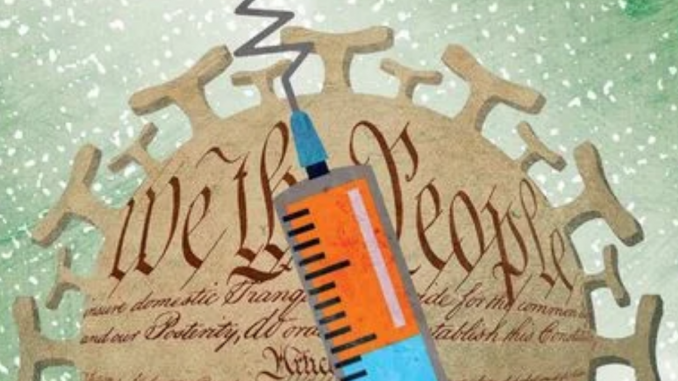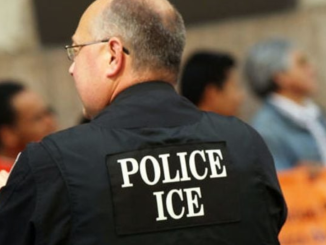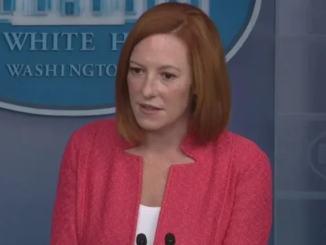
With the rise of the so-called Delta variant of COVID-19 and full FDA approval of the Pfizer vaccine, leftist authoritarians in academia and the media have increased calls for forced vaccination of non-willing Americans under the penalty of criminal sanctions.
Force and coercion are inherent in the use of government power, and we should be skeptical even under the most normal of circumstances. But there’s nothing “normal” about proposing that individuals be punished for not injecting a chemical into their bodies, no matter how much “sense” it makes or the proffered benefits to the collective.
Rather than confront the complexity and nuance of proposed mandated COVID-19 vaccinations head-on, the talking heads appear more interested in working backward to justify their personal ideological preferences.
There are four critical errors in this approach.
First, forced vaccinators fundamentally mistake the political theory and foundational principles undergirding the American republic. Our system is founded on a presumption of individual liberty rather than on free-wheeling government action held to be legitimate unless prohibited. And that includes the right to decide what chemicals get injected into our own bodies.
As described in the Declaration of Independence and confirmed by subsequent history, all political power resides with the people. Governments, whether national, state, or local, have no inherent authority outside of what they are granted.
Rather than a license to do whatever it deems in the best interests of the people (whether they like it or not), the single, most important element of federal government authority is the protection of individual rights.
Second, forced vaccinators conflate key concepts of federalism. Under the Constitution, power is divided between the federal government and the states. Unlike the states, which possess a general “police power” to regulate in the interests of citizens’ health, safety, and morals, the federal government is limited to specific and enumerated powers.
In other words, unless granted the specific power to do something, the federal government is out of luck. Hence, the FDA’s approval of various vaccines does not influence the constitutionality of forced mandates or the ability of the states to enforce them.
This is true even if it is the best idea in the world (a dubious proposition in this instance).
Third, and speaking of those state-based police powers, forced vaccinators often cite the 1905 Supreme Court decision in the case Jacobson v. Massachusetts as the absolute gospel on the authority of government to act during a health crisis.
But Jacobson is far from the final word on constitutional actions during COVID-19.
Jacobson concerned a local mandatory vaccination law to inoculate against smallpox. In addition to this being a very different factual scenario from large-scale actions in the face of Covid-19, Jacobson also took place in an era that predates the development of modern constitutional individual rights analysis.
Jacobson simply does not answer the questions presented by forced COVID-19 vaccinations, as was recognized by Justice Neil Gorsuch, who recently wrote that “Jacobson hardly supports cutting the Constitution loose during a pandemic.”
Finally, forced vaccinators often exaggerate the dangers of COVID-19 to the general public out of a desire to conquer the straw man that the Constitution is a “death pact.”
But anyone who has been paying the least bit of attention over the past year and a half can see that COVID-19 has been, and will likely continue to be, far from the apocalyptic disaster the alarmists would have us believe.
Since almost the beginning of the pandemic, we have known that while COVID-19 can make otherwise healthy individuals sick, it presents a serious health risk to only a small, identifiable segment of the population.
This includes individuals over 65 years of age, those with lung disease, and those who are obese, suffering from diabetes or heart disease, or otherwise immunocompromised.
The greater risk to general public health and safety appears to have arisen from shutting down the economy, shuttering businesses, closing schools, and all but ordering people locked inside their homes. The result has been skyrocketing cases of domestic abuse, substance abuse, and mental health crises, and suicide.
The record of history is absolutely clear.
Nearly every epoch in which civil liberties were seriously undermined began with those in power assuring us there was an emergency that necessitated acting in our “best interests.” But if history teaches us anything, and if our system of government stands for any principle, it is that the more convinced bureaucrats are, they know what’s best for us, the more skeptical we should be.
Daniel Webster once stated that “(T)he Constitution was made to guard the people against the dangers of good intentions.”
The good intentions of “experts” are exactly the danger we currently face.
The presence of Covid-19 may be the “new normal,” but we cannot let it become the excuse for abandoning our most cherished political principles and constitutional protections.
*story by The Washington Times


